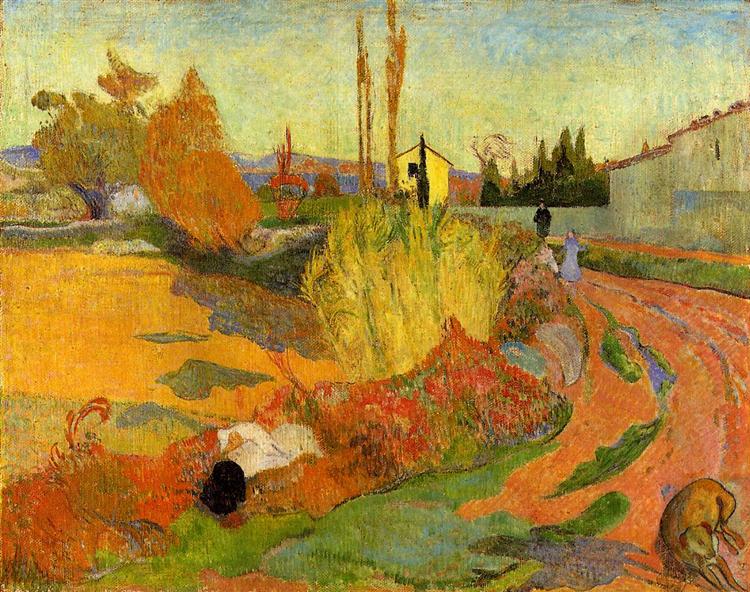Description
Paul Gauguin's painting "Landscape at Arles", painted in 1888, captures one of the most significant stages of the artist's career, in which he experimented boldly with color and form, becoming one of the precursors of symbolism in painting. This work is set in the context of his stay in the south of France, in Arles, where Gauguin was searching for a new pictorial language that would break with the conventional norms of representation.
Visually, the painting is characterized by its vibrant color palette, which resonates with the influence of the natural environment in which it was created. “Landscape at Arles” presents a panorama of fields and trees, where green and yellow tones alternate in an almost playful way, evidencing how sunlight transforms the landscape. This contrast of tones not only energizes the composition, but also speaks to Gauguin’s emotional approach to nature, where the use of color becomes an expressive rather than descriptive means.
The perspective of the work is remarkable. The horizon is set quite high, which, together with the arrangement of elements at the bottom of the canvas, suggests a sense of depth and spaciousness. In this work, nature is not simply a background for the human figure, as is often the case in other pictorial traditions, but becomes a protagonist in its own right. Bushes and trees can be seen which, although stylised, evoke a three-dimensionality that invites the viewer to enter into the landscape.
Gauguin's technique of visible, gestural brushstrokes lends a tactile texture to the surface of the canvas, emphasizing the emotional character of the landscape. These brushstrokes, which move with a certain freedom, contrast with the more rigid structure found in other contemporary works, revealing Gauguin's search for a more personal and less academic expression.
It is interesting to note that there are no human figures in this work, which is a departure from many of his other compositions. This may reflect a particular moment of introspection and contemplation, where the landscape becomes a refuge and a means of connecting with the essence of being. This omission of human characters also allows the viewer to fully immerse themselves in the surroundings, focusing on the colours, shapes and light without distraction.
"Landscape at Arles" is a testament to the radical change in style that Gauguin underwent during this period. Although echoes of his Impressionist training can still be seen, his compositional choices and use of color point toward a new direction that will be distinguished in his later works. The painting introduces the viewer to a sensory experience focused on nature as well as the emotional interpretation that Gauguin injects into his landscape.
Ultimately, "Landscape in Arles" not only represents a specific place and time, but also invites reflection on the role of the artist in creating reality on canvas. It is a work that, in addition to being visually attractive, offers a glimpse into Gauguin's stylistic evolution and his constant search for an art that transcends mere representation, coming closer to a visual language that dialogues with emotions and human experience.
KUADROS ©, a famous painting on your wall.
Hand-made oil painting reproductions, with the quality of professional artists and the distinctive seal of KUADROS ©.
Painting reproduction service with satisfaction guarantee. If you are not completely satisfied with the replica of your painting, we will refund 100% of your money.

